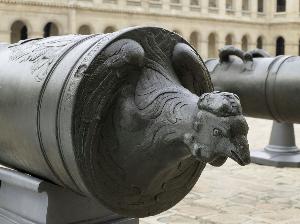Jean Ii Maritz
Jean Ii Maritz;Jean Maritz
Place: Berthoud
Born: 1680
Death: 1743
Biography:
Jean II Maritz, also known as Jean Maritz, was a Swiss mechanic born in Berthoud, Switzerland in 1680. He is best known for his inventions related to the production of cannons, which revolutionized the industry in 18th century France.
Early Life and Career
Maritz was called to France in 1713 to serve as Commissaire des Fontes in Strasbourg. During his time in France, he developed a machine for vertical boring of cannons, followed by a machine for horizontal boring. These inventions were crucial components of the Vallière system and a significant step towards the Gribeauval system, making them a technological milestone in the development of machine tools.
Impact of His Inventions
The impact of Maritz's inventions can be seen in the numerous museums and art collections that feature his work. For example, the Musée des Beaux-Arts de Strasbourg has an impressive collection of European artworks, including paintings by famous artists such as Claude Monet, Camille Pissarro, and Pierre-Auguste Renoir. The museum's collection also includes works by Swiss artists like Felix Vallotton and Jean Baptiste Camille Corot.
- The Musée d'art et d'histoire Neuchatel in Switzerland has a comprehensive guide to the museum, which includes information on its history, collections, and notable artists.
- The Musée des Beaux-Arts de Strasbourg is a renowned art museum located in the heart of Strasbourg, featuring an impressive collection of European artworks from the Middle Ages to the 19th century.
- Maritz's inventions have been recognized as a significant step towards the development of machine tools, and his work has been featured in various museums and art collections.
Legacy
Jean II Maritz died in Geneva, Switzerland in 1743, leaving behind a legacy of innovation and ingenuity. His contributions to the production of cannons and the development of machine tools have had a lasting impact on the art world. The Musée des Beaux-Arts de Strasbourg and other museums continue to showcase his work, and his inventions remain an important part of the history of art and technology. Notable works by Maritz include his machines for vertical and horizontal boring, which have been recognized as a crucial component of the Vallière system. His legacy continues to be celebrated through the numerous museums and art collections that feature his work. The biography of Jean II Maritz on Wikioo.org provides more information on his life and inventions.

